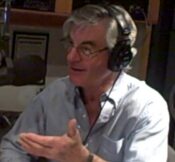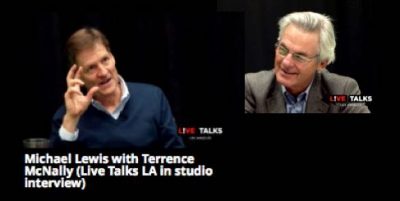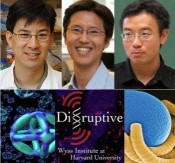FREE FORUM plays online
Progressive Voices Network TuneIn.com
Saturday 7/27 7pPT & Sunday 7/28 8pPT
For 25 years my conversations have sought A World That Just Might Work. I also produced & hosted the podcast series Disruptive for Harvard’s Wyss Institute for Biologically Inspired Engineering.
_____________________

FREE FORUM plays online
Progressive Voices Network TuneIn.com
Saturday 7/27 7pPT & Sunday 7/28 8pPT
Listen any time to Podcast
ROB JOHNSON & I
in conversation 11-05-2020
1st show after Biden’s election
Listen any time to Podcast
GEORGE PACKER
WHAT WILL BECOME OF
AMERICAN CIVILIZATION?
Phoenix AZ: Drought,
Delusion, and Division
Featured Podcasts:
BRENDAN BALLOU, Plunder: Private Equity’s Plan to Pillage America
MICHELLE WILDE ANDERSON, Saving Towns and Reviving Discarded America
PAUL HAWKEN, Regeneration – life at the center of all we do
GEORGE PACKER, Last Best Hope – four narratives that divide us
NAOMI ORESKES & ERIK CONWAY, The Big Myth: How American Business Taught Us
to Loathe Government and Love the Free Market
TERRENCE McNALLY, 60s.2.0 meets OK Boomer _______________________________________________________
Yuval Noah Harari (2018)
Sapiens: A Brief History of Humankind, 21 Lessons for the 21st Century
_________________________________________
Michael Lewis, The Undoing Project (2017)
Tversky, Kahneman and the ways our minds fool us.
Link to video
_________________________________________

DISRUPTIVE – the podcast from Harvard’s Wyss Institute for Biologically Inspired Engineering.
We’re learning to take advantage of properties of DNA that have served nature well- but in ways nature may have never pursued. We build with it. We tap its capacity to carry information to enhance our ability to explore the inner life of cells.
In this episode, Wyss faculty members William Shih, Wesley Wong and Peng Yin share what it’s like being on the frontier of science, explain how and why they program DNA, and consider potential applications of their work.
Disruptive: Molecular Robotics transcript

Timed Transcript
DISRUPTIVE Episode #5: MOLECULAR ROBOTICS
Terrence McNally:
Hello, I’m Terrence McNally and you’re listening to Disruptive, the podcast from Harvard’s Wyss Institute for Biologically-Inspired Engineering.
I thought I knew what DNA was. I knew it carried genetic information. I’d seen the picture of the double-helix at least a hundred times.
Imagine what it took for us to figure that out. And the shifts in perspective that that understanding made possible.
But we have taken our understanding of DNA to another level. We’re beginning to take advantage of some of the properties of DNA that have served nature so well – but in ways that nature may never have pursued.
We build with it. We tap its capacity to carry information to enhance our ability to see and to study molecular interactions and the inner life of cells.
As a medium for nano-scale engineering, DNA is smart, tough, flexible – and programmable. New methods in DNA self-assembly enable the precise engineering of nano-scale structures to produce revolutionary devices in computer science, microscopy, biology, and more.
I’m going to speak about this cutting-edge work with Wyss Institute core faculty members William Shih and Peng Yin and associate faculty member Wesley Wong.
The mission of the Wyss Institute is to transform healthcare, industry, and the environment by emulating the way nature builds.
Our bodies – and all living systems – accomplish tasks far more sophisticated and dynamic than any entity yet designed by humans.
By emulating nature’s principles for self-organizing and self-regulating, Wyss research develops innovative engineering solutions for healthcare, energy, architecture, robotics, and manufacturing.
William Shih is an associate professor in the Department of Biological Chemistry and Molecular Pharmacology at Harvard Medical School and the Department of Cancer Biology at the Dana-Farber Cancer Institute. He oversees an effort to apply synthetic biology approaches to the development of self-assembling DNA nano-structures and devices for use in biomedical applications. In 2008, Shih received a New Innovator Award from the National Institutes of Health.
[02:07] McNally:
Welcome, William Shih, to Disruptive.
Shih:
Thanks, happy to be here.
Continue reading “Disruptive #5: Molecular Robotics – Building with DNA”
 |
Aired 09/04/11
VAN JONES is Co-Founder and President of REBUILD THE DREAM, and a co-founder of three other successful non-profit organizations: the Ella Baker Center for Human Rights, Color of Change and Green For All. Jones served as the green jobs advisor in the Obama White House in 2009, and is currently a senior fellow at the Center For American Progress and a senior policy advisor at Green For All. He holds a joint appointment at Princeton University, as a distinguished visiting fellow in both the Center for African American Studies and in the Program in Science, Technology and Environmental Policy at the Woodrow Wilson School of Public and International Affairs. He is the author of The Green Collar Economy.
http://ourfuture.org/conference
This new website, [Stories of] A World That Just Might Work, is possible now because my two paths have merged. Over the last few years, most of my speeches, workshops and consulting have focused on the power and practice of story and narrative.
And I’ve come to realize that more and more that’s also what I’m aiming for in radio. In interviews, I’ve always been looking for stories and a through-line, but it’s grown more conscious lately. I interview people from all sorts of fields. The common thread is that I suspect our conversations are on a path to a world that just might work. I’m looking for narratives that make sense of our situation, narratives in which we see ourselves and in which we can play productive roles.
At the same time, I’m bringing a wider perspective to my story work with organizations.
I used to encourage people to tell primarily individual stories and some organizational stories. To engage audiences – of one or of many – in hearts as well as minds, I recommended telling tales of individual protagonists – clients, staff, volunteers — overcoming obstacles to achieve goals.
I’ve come to realize that we live and we act in a web of interconnecting stories. Imagine Russian dolls, one inside another. You live in a web of narratives, one inside another. To truly tap the power of narrative, it helps to see yourself in bigger stories. Find yourself in the stories of your organization, your company, your community. Find yourself in the story of your field or your movement. And finally find yourself in the
big story of transforming our society.